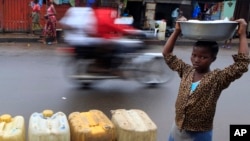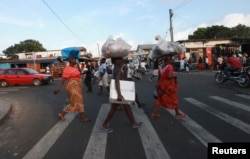Liberia and the United States this week signed a $257 million Millennium Challenge Corporation Compact in Washington. Liberian Vice President Joseph Boakai and Planning and Economic Affairs Minister Amara Konneh participated in the ceremonial signing at the State Department on behalf of the Liberian government.
The agreement highlights the United States’ re-engagement with Liberia in its post-Ebola recovery, and will focus on hydropower generation, electricity sector reform and road maintenance sector reform.
“Besides the fact that this money coming into the country to benefit infrastructure, namely electricity and roads, it is very significant in that the compact is about governance, and it does underscore the fact that we are trying to do our best to put the right institutions in place,” Boakai said.
A release from Vice President Boakai’s office said the MCC, under the new compact, will fund the rehabilitation of the Mount Coffee Hydroelectric Plan, the development of a training center for electricians, an energy sector regulator and a nationwide road maintenance framework.
Liberia suffers from poor infrastructure, including a deplorable road network and lack of dependable electricity despite hundreds of millions of dollars in foreign investment that has been flowing into the country since President Ellen Johnson Sirleaf came to power 10 years ago.
“Liberia is 168 years old. A lot of things have happened. We inherited those problems and it is not that we are not doing anything about it. Just about the time the hydro project was to commence that’s when Ebola struck and everybody left the country. But apart from the hydro, there are other facilities in place, like the HFO machines that would be able to provide more than 40 megawatts of electricity,” Boakai said.
The vice president said Liberia had sizable foreign investment before the Ebola outbreak. Since then, he said a lot of investors have been returning to the country, particularly to invest in the agriculture industry.
He said the Liberian legal system is working but needs improvement. “It means that it needs improvement; it means that the judges, the courts have to move on actions very vast. We have specialized courts to deal with different cases so as to expedite the process,” he said.
Boakai also said the Sirleaf government is trying to address the problem of corruption, although he said no country can actually claim it can defeat corruption.
“We know that there are people in the society who undermine the economy through their conduct. But when the law finally comes to grip with the people, they have been asked to resign, some of them are being prosecuted, Boakai said.










